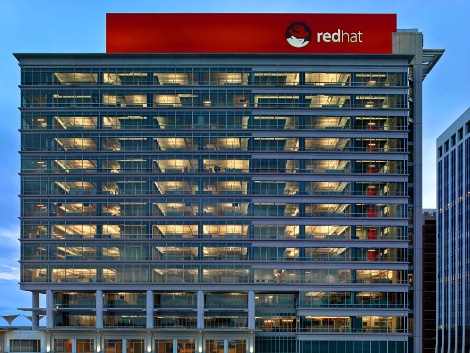Microsoft Adds OpenShift and RHEL Support to Azure Arc, Its Hybrid and Multi-Cloud PlatformMicrosoft Adds OpenShift and RHEL Support to Azure Arc, Its Hybrid and Multi-Cloud Platform
Having Red Hat on board is important, because the open source company and its parent IBM are two of the largest advocates of the hybrid cloud approach.

Microsoft Arc may still be only in preview, but the company is adding new capabilites to the hybrid cloud solution.
At the recent virtual Red Hat Summit, Microsoft's cloud and AI group's executive VP, Scott Guthrie, joined Red Hat CEO Paul Cormier to explain that Red Hat and Azure engineers have been working side-by-side to integrate Red Hat Enterprise Linux and the OpenShift container platform into Arc. At the same time, Arc has been expanded to manage SQL Server on RHEL, providing the operating system with integrated database and server governance via unified Azure Policies.
Arc is a feature Azure announced in November as a relatively easy way to on-ramp to hybrid cloud, the cloud approach that extends the reach of on-premises infrastructures to include multiple clouds -- largely by bypassing services that are specific to individual public clouds. While this expands the reach of on-prem data centers without tying users to a single cloud provider, it adds management complexity that Arc seeks to address.
"We keep hearing from our customers that they want to use a single pane of glass to take advantage of this cloud era scaled economy," Guthrie said. "With our Azure Arc capability, we now enable our customers to manage OpenShift clusters and RHEL servers running anywhere using our Azure Resource Manager."
Once Arc reaches general availability, users will be able to harness it to view inventory and search from within Azure to apply policies and manage compliance for connected servers and clusters, while taking advantage of Azure's built-in security policies and role-based access control. The sweet spot for users is that everything will work the same, whether it's on-prem, on Azure, or on another cloud. The sweet spot for Microsoft is that those using it will have to continue to include Azure as part of their hybrid cloud mix.

Azure-Arc
Having Red Hat on board is important, because the open source company and its parent IBM are two of the largest advocates of the hybrid cloud approach.
Guthrie also announced that Azure Red Hat OpenShift, a service introduced about a year ago that integrates Red Hat's Kubernetes platform with Azure services support, now supports OpenShift 4.
According to a blog by Azure's general manager Arpan Shah, to take advantage of OpenShift 4's new capabilities, Azure is "enabling features to support hybrid and enterprise customer scenarios."
These include "private API and ingress endpoints" that allow users to choose between public and private cluster management and ingress endpoints, industry compliance certifications, and multi-availability zones clusters with cluster components deployed across three availability zones in supported Azure regions to maintain high availability.
Shah added that Azure also has "enabled the cluster-admin role on Azure Red Hat OpenShift clusters, enabling full cluster customization capabilities, such as running privileged containers and installing Custom Resource Definitions."
While OpenShift 4 on Azure Red Hat Open Shift is immediately available for production use, Azure Arc has not yet reached GA, and no target date has been announced. However, a preview that includes the latest Red Hat additions is currently available.
About the Authors
You May Also Like








.jpg?width=700&auto=webp&quality=80&disable=upscale)
